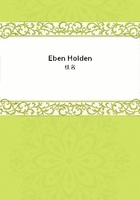
第18章
The lone pine stood in Brower's pasture, just clear of the woods.
When the sun rose, one could see its taper shadow stretching away to the foot of Woody Ledge, and at sunset it lay like a fallen mast athwart the cow-paths, its long top arm a flying pennant on the side of Bowman's Hill. In summer this bar of shadow moved like a clock-hand on the green dial of the pasture, and the help could tell the time by the slant of it. Lone Pine had a mighty girth at the bottom, and its bare body tapered into the sky as straight as an arrow. Uncle Eb used to say that its one long, naked branch that swung and creaked near the top of it, like a sign of hospitality on the highway of the birds, was two hundred feet above ground.
There were a few stubs here and there upon its shaft -the roost of crows and owls and hen-hawks. It must have passed for a low resort in the feathered kingdom because it was only the robbers of the sky that halted on Lone Pine.
This towering shaft of dead timber commemorated the ancient forest through which the northern Yankees cut their trails in the beginning of the century. They were a tall, big fisted, brawny lot of men who came across the Adirondacks from Vermont, and began to break the green canopy that for ages had covered the valley of the St Lawrence. Generally they drove a cow with them, and such game as they could kill on the journey supplemented their diet of 'pudding and milk'. Some settled where the wagon broke or where they had buried a member of the family, and there they cleared the forests that once covered the smooth acres of today. Gradually the rough surface of the trail grew smoother until it became Paradise Road - the well-worn thoroughfare of the stagecoach with its 'inns and outs', as the drivers used to say - the inns where the 'men folks' sat in the firelight of the blating logs after supper and told tales of adventure until bedtime, while the women sat with their knitting in the parlour, and the young men wrestled in the stableyard. The men of middle age had stooped and massive shoulders, and deep-furrowed brows: Tell one of them he was growing old and he might answer you by holding his whip in front of him and leaping over it between his hands.
There was a little clearing around that big pine tree when David Brower settled in the valley. Its shadows shifting in the light of sun and moon, like the arm of a compass, swept the spreading acres of his farm, and he built his house some forty rods from the foot of it on higher ground. David was the oldest of thirteen children. His father had died the year before he came to St Lawrence county, leaving him nothing but heavy responsibilities. Fortunately, his great strength and his kindly nature were equal to the burden.
Mother and children were landed safely in their new home on Bowman's Hill the day that David was eighteen. I have heard the old folks of that country tell what a splendid figure of a man he was those days - six feet one in his stockings and broad at the shoulder. His eyes were grey and set under heavy brows. I have never forgotten the big man that laid hold of me and the broad clean-shaven serious face, that looked into mine the day I came to Paradise Valley. As I write I can see plainly his dimpled chin, his large nose, his firm mouth that was the key to his character. 'Open or shet,' I have heard the old folks say, 'it showed he was no fool.'
After two years David took a wife and settled in Paradise Valley.